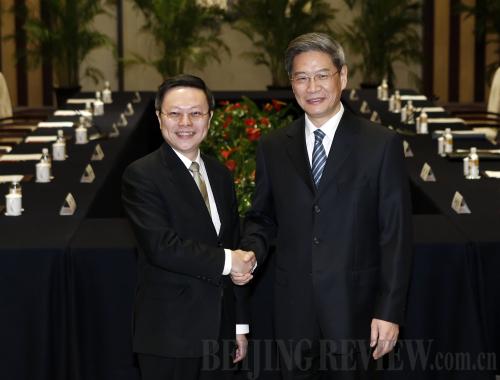|
 |
|
LANDMARK MEETING: Zhang Zhijun (right), head of the State Council Taiwan Affairs Office, shakes hands with Wang Yu-chi, Taiwan's mainland affairs chief, before their first formal meeting in Nanjing, Jiangsu Province, on February 11 (SHEN BOHAN) |
Top leaders on cross-Straits relations from the Chinese mainland and Taiwan met formally for the first time since 1949 on February 11.
At their meeting in Nanjing, capital of east China's Jiangsu Province, Zhang Zhijun, head of the State Council Taiwan Affairs Office (SCTAO), and Wang Yu-chi, Taiwan's mainland affairs chief, agreed to open a regular communication channel between their departments.
"I believe that we will improve exchanges, understanding and mutual trust with this arrangement, and be able to better handle outstanding obstacles in cross-Straits exchanges," Zhang said. He added that the move shows deepening mutual political trust on the basis of the 1992 Consensus between the mainland and Taiwan on the one-China principle.
When explaining how the communication channel will operate at a press conference, Wang said that senior officials of the two departments could "just pick up their mobile phones and talk" instead of setting up a special hot line.
Wang Zhiguo, an assistant researcher with the Institute of Taiwan Studies at the Chinese Academy of Social Sciences, said that the success of the first formal meeting between Zhang and Wang and the establishment of a regular communication channel are significant to deepening cross-Straits political trust. Furthermore, it may bring about substantial progress and help lay a more solid foundation for promoting the all-round development of ties between the mainland and Taiwan.
Zhang and Wang first met informally on the sidelines of the Economic Leaders' Meeting of the Asia-Pacific Economic Cooperation in Bali, Indonesia, last October, when they agreed to mutual visits.
The latest Zhang-Wang meeting is an important breakthrough and may lead to regular visits, according to Yan Anlin, Executive Director of Institute for Taiwan, Hong Kong & Macao Studies at the Shanghai Institutes for International Studies.
It was revealed by Ma Xiaoguang, a spokesman for the SCTAO, that Zhang had accepted Wang's invitation to visit Taiwan during their meeting.
Significant meeting
In his speech at the meeting, Wang described his meeting with Zhang as "unimaginable in earlier years."
"Being able to sit down and talk is valuable, considering that the two sides were once almost at war," Wang said.
Zhang agreed that such a meeting would have been impossible earlier and called for "a little more imagination" in cross-Straits relations.
Relations between the mainland and Taiwan stalled when the Kuomintang, led by Chiang Kai-shek, fled to Taiwan in 1949 after being defeated in a civil war.
Business and personnel exchanges resumed in the late 1980s, and in the early 1990s, the two sides began engagements with one other through the mainland-based Association for Relations Across the Taiwan Straits (ARATS) and its Taiwanese counterpart the Straits Exchange Foundation (SEF).
The ARATS and SEF are two non-governmental organizations that were founded in 1991 and 1990 respectively to focus on detailed affairs and cross-Straits agreements.
In November 1992, the ARATS and the SEF reached a common understanding that each of the two organizations should express verbally that "both sides of the Taiwan Straits adhere to the one-China principle."
| 